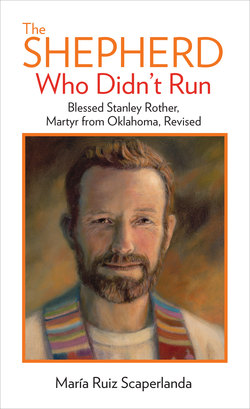Читать книгу The Shepherd Who Didn't Run - Maria Ruiz Scaperlanda - Страница 12
На сайте Литреса книга снята с продажи.
ОглавлениеChapter 3
A New Beginning
The day that Stanley left San Antonio, the rector of Assumption Seminary wrote a letter to Oklahoma City’s Bishop Victor Reed: “I deeply regret to inform you that we have had to ask Mr. Stanley Rother to discontinue his studies for the priesthood. This young man has continually had difficulty in his class work and at the end of this present half year we find he has failed in his moral theology and his dogmatic theology. Consequently, since he has already repeated one year in his course, we feel that it is unjust to him and to the diocese to allow him to continue. Therefore, we have advised him to leave and he seemed quite aware of the fact that he lacks intellectual ability to continue on for the priesthood.”
When Stanley and his hastily packed bags got off the plane at Oklahoma City’s Will Rogers Airport, Franz and Gertrude Rother were at the gate waiting for him. As parents, they must have felt a mixture of relief at being able to see him in person after hearing the shocking news, to hug him, and to reassure him as best they could — along with genuine concern for the well-being of their oldest son, and his future.
It was Stanley’s pastor, Father Edmund Von Elm, who drove him to a dinner that night with Monsignor S. F. Luecke, the diocesan director of vocations. And it was the three men together who proceeded to Bishop Victor Reed’s house for the unexpected meeting that would discuss Stanley’s situation.
There is no official or written record of that meeting, only Stanley’s concise mention in his journal: “Saw Bishop and he will send me on next fall.”
Yet that one sentence is enough to assume that a very personal, candid, and open discussion must have taken place. With less than a year under his belt as bishop of Oklahoma, Bishop Reed did not know Stanley very well. But something must have happened during that fateful meeting that made Bishop Reed confident enough about Stanley and his desire to study for the priesthood to trust that a new seminary would be found for him.
When Stanley’s sister heard about his failure in San Antonio, she was very disappointed. “I didn’t know how to deal with it. I was alone in Wichita and was deeply sad that it had happened,” Sister Marita remembered. “But I kept praying that if that’s what he was supposed to do, that there would be a way for him to do it.”
She also had a difficult time understanding what happened to Stanley to make him fail academically. “I am of the firm belief that he didn’t learn the material because other things appealed to him. The farmer was still in him, so if he had an opportunity to go out and plant things, he did it! He neglected what he didn’t want to do, and that was to learn a language,” Sister Marita said, regarding Stanley’s struggle with the Latin textbooks. “I don’t think I really hold that as an excuse for him, but I do see that as my remembrance of him. Because I know that my parents were very strict with us, and doing our best was a very important value in our family.”
After what must have been a difficult month of introspection at home in Okarche, the diocese asked Stanley to move to the new and as yet unopened St. Francis de Sales Seminary in northwest Oklahoma City. Stanley was not asked to attend the minor seminary, but instead to help work on and prepare the building for use. Because of this unusual assignment, Stanley Rother holds the distinction of being the first person to sleep overnight in the structure that currently serves as a conference center, pastoral center, and a retired priests’ complex for the Archdiocese of Oklahoma City.
Stanley spent the next three months preparing the large building that would serve the statewide diocese as the preparatory seminary for young men in high school and the first two years of college. He repaired. He painted. He cleaned. He installed. He landscaped the grounds. In retrospect, it seems likely that the amount and the type of work that Stanley was engaged in full-time was probably the best possible healing and recovery for his wounded confidence.
What he didn’t know, noted Father Monahan in his unpublished biography, was the difficulty that vocations director Monsignor Luecke was having in locating a suitable seminary for him. “A student for the priesthood with his scholastic record did not beget enthusiasm for acceptance on the part of seminary rectors.”
